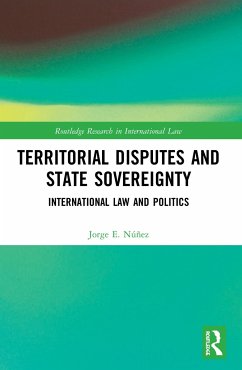
Ethnofederalism in Cyprus
Territory, Power and Security
Versandkostenfrei!
Versandfertig in 6-10 Tagen
154,99 €
inkl. MwSt.
Weitere Ausgaben:

PAYBACK Punkte
77 °P sammeln!
This book develops a holistic understanding of the intrinsic security concerns which lie at the heart of the protracted conflict in Cyprus.This work offers a well-grounded account of intractability in Cyprus by unfolding the rationale and prevalence of competitive approaches held by Greek and Turkish Cypriots alike. The analysis explains how crude security interests give birth to an existentialist security dilemma that has so far prevented Greek and Turkish Cypriots, and their security guarantors, from reaching a durable settlement. This book contains a systematic critique of the breadth and d...
This book develops a holistic understanding of the intrinsic security concerns which lie at the heart of the protracted conflict in Cyprus.
This work offers a well-grounded account of intractability in Cyprus by unfolding the rationale and prevalence of competitive approaches held by Greek and Turkish Cypriots alike. The analysis explains how crude security interests give birth to an existentialist security dilemma that has so far prevented Greek and Turkish Cypriots, and their security guarantors, from reaching a durable settlement. This book contains a systematic critique of the breadth and depth of the major security concerns embedded in the proposed federal bi zonal framework for Cyprus, uncovering the impetus and rationale of the underlying insecurities that prompt the Greek and Turkish sides to compete on a series of state building aspects, including the opposing understandings of self determination and sovereignty, the competitive underpinnings of federal institutional design, and the problematic role of third party involvement. This book ultimately unravels a deeper and more pragmatic understanding of how competitive security considerations and geopolitical considerations link up to ethno federal design in post conflict environments.
This book will be of much interest to students of conflict studies, federalism studies, statebuilding, European politics, and International Relations.
This work offers a well-grounded account of intractability in Cyprus by unfolding the rationale and prevalence of competitive approaches held by Greek and Turkish Cypriots alike. The analysis explains how crude security interests give birth to an existentialist security dilemma that has so far prevented Greek and Turkish Cypriots, and their security guarantors, from reaching a durable settlement. This book contains a systematic critique of the breadth and depth of the major security concerns embedded in the proposed federal bi zonal framework for Cyprus, uncovering the impetus and rationale of the underlying insecurities that prompt the Greek and Turkish sides to compete on a series of state building aspects, including the opposing understandings of self determination and sovereignty, the competitive underpinnings of federal institutional design, and the problematic role of third party involvement. This book ultimately unravels a deeper and more pragmatic understanding of how competitive security considerations and geopolitical considerations link up to ethno federal design in post conflict environments.
This book will be of much interest to students of conflict studies, federalism studies, statebuilding, European politics, and International Relations.














